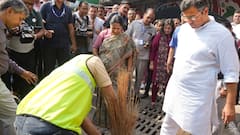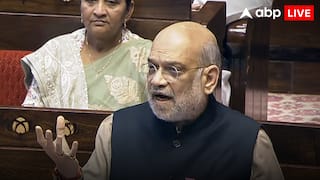Haryana Lists Measures To Curb Farm Fires During Winter To Tackle Pollution
The Haryana Chief Secretary called for a collaborative approach with the officers of agriculture and police departments deployed at district, block, and village levels to monitor and curb farm fires.

Haryana Chief Secretary Sanjeev Kaushal on Friday issued a series of instructions to prevent stubble burning in the state, especially during the winter. During a meeting in Chandigarh to review the steps being taken to prevent stubble burning, Kaushal said that there would be no leniency when it comes to penalising stubble burning and urged district authorities to impose fines against those responsible, and penalise officers who show laxity as well.
According to a report by news agency PTI, the Chief Secretary gave details of fines to be imposed and also stated that the names and villages of the offenders were to be published in newspapers. This is to create transparency and also act as a deterrent for those who are thinking about using stubble burning as a method to get rid of waste from the fields.
Kaushal called for a collaborative approach with the officers of agriculture and police departments deployed at district, block, and village levels to vigilantly monitor and curb farm fires.
While expressing his concern, Kaushal said, "Anyone harming the environment is an enemy of humanity”. He spoke about the need to engage with farmer leaders to raise awareness about the government's incentives.
He also emphasised the importance of delivering equipment to small and marginal farmers.
Kaushal said that in 2023, the state aims to effectively manage around 37 lakh tonnes of paddy straw, with almost one-third of this resource being repurposed by various industries. An estimated 13.54 lakh metric tons of paddy straw is likely to be used by major industries.
For this, the government is offering financial incentives, such as Rs 1,000 per acre for management of paddy crop residue, Rs 7,000 per acre for diversification of paddy area with alternative crops under the 'Mera Pani Meri Virasat' scheme, and Rs 4,000 per acre for the adoption of direct sowing of rice, according to PTI.
Meanwhile, Delhi Chief Minister Arvind Kejriwal released a 15-point 'Winter Action Plan' to curb pollution in the national capital during winter months. Every year, during the winter month the city sees worsening air quality and smog. CM Kejriwal listed out a list of measures that the government will take to reduce the dust, and air pollution in Delhi. The 15-point action plan includes ways to deal with stubble burning, vehicular pollution, open garbage burning, and industrial pollution. The agenda also features setting up a "green war room", a real-time apportionment study, a complete ban on firecrackers, tree plantation drives, urban farming drives, and eco waste park among other things, the Delhi CM said.






































